
Nov 20, 2016 | Non categorizzato
 I thought I knew everything “As a priest, I thought I knew how to judge everything. One day I was invited to celebrate Mass at a retreat of some committed young people. During the rites they explicitly made a pact to be ready to give their lives for each other. I was shocked! Would I have been able to do such a thing? All that I knew it seemed, although not useless, was insufficient to be a true Christian. How many things were neglected in the name of studies? How many omissions were justified with some effort I thought was important! Those young people have changed my life.” (RP – France) Before the offering “After moving into the new village, the friendship that was born with a family in the neighbourhood greatly helped us to insert ourselves into the new environment, even helping the children get to school. There was mutual esteem.The children of that family called us uncle and auntie and so did our children also address them that way. Unfortunately, in time the relationship became a bit strained and the children of these neighbours began to greet us with a formal “Good morning”. It could not go on like this also because we belonged to the same parish. One Sunday at Mass, the Gospel passage reminded us that before making an offering at the altar, it would be well to reconcile oneself with the brother. My wife and I looked at each other and we decided to act accordingly. After Mass, we approached those neighbours and asked their forgiveness if we had offended them in some way. After a moment of awkwardness, we hugged each other.” (AT – Hungary) She was another person “In the hospital where I work as a gynecologist, a woman known as a prostitute was admitted. Other patients and even some nurses tried to avoid her. Noticing her isolation, I gave her particular attention and this encouraged others to also talk to her and give her some help. The same sad story of her life attracted attention and benevolence. In just a few days, she already seemed another person. When she was discharged from the hospital, she thanked me saying, “True healing is not physical. Life starts again in another way.” (MS – Poland)
I thought I knew everything “As a priest, I thought I knew how to judge everything. One day I was invited to celebrate Mass at a retreat of some committed young people. During the rites they explicitly made a pact to be ready to give their lives for each other. I was shocked! Would I have been able to do such a thing? All that I knew it seemed, although not useless, was insufficient to be a true Christian. How many things were neglected in the name of studies? How many omissions were justified with some effort I thought was important! Those young people have changed my life.” (RP – France) Before the offering “After moving into the new village, the friendship that was born with a family in the neighbourhood greatly helped us to insert ourselves into the new environment, even helping the children get to school. There was mutual esteem.The children of that family called us uncle and auntie and so did our children also address them that way. Unfortunately, in time the relationship became a bit strained and the children of these neighbours began to greet us with a formal “Good morning”. It could not go on like this also because we belonged to the same parish. One Sunday at Mass, the Gospel passage reminded us that before making an offering at the altar, it would be well to reconcile oneself with the brother. My wife and I looked at each other and we decided to act accordingly. After Mass, we approached those neighbours and asked their forgiveness if we had offended them in some way. After a moment of awkwardness, we hugged each other.” (AT – Hungary) She was another person “In the hospital where I work as a gynecologist, a woman known as a prostitute was admitted. Other patients and even some nurses tried to avoid her. Noticing her isolation, I gave her particular attention and this encouraged others to also talk to her and give her some help. The same sad story of her life attracted attention and benevolence. In just a few days, she already seemed another person. When she was discharged from the hospital, she thanked me saying, “True healing is not physical. Life starts again in another way.” (MS – Poland)
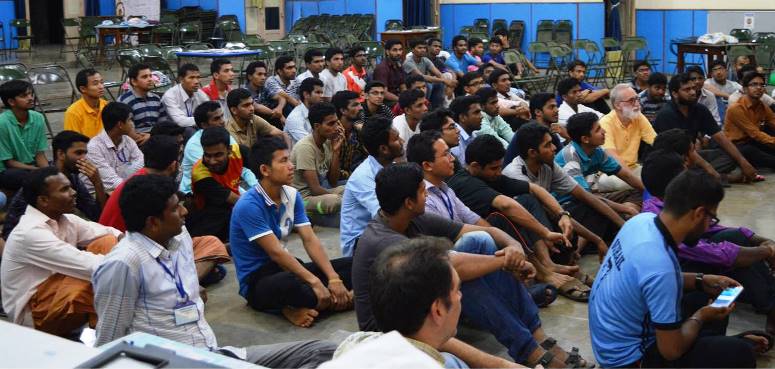
Nov 19, 2016 | Non categorizzato
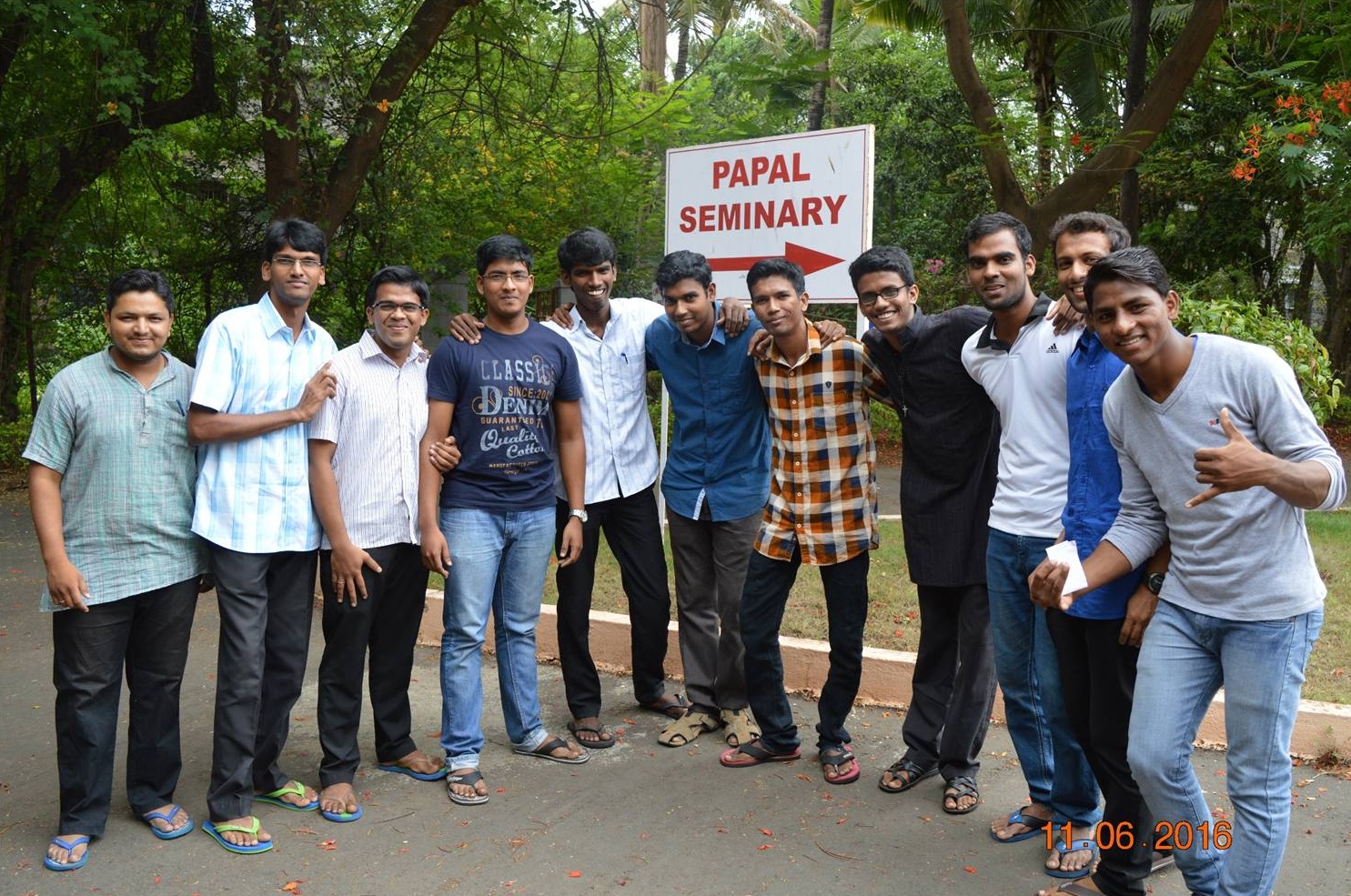 “I learned to be open and not to sweep the dust under the rug,” remarked one seminarians who had attended the workshop on group dynamics based on the Focolare’s spirituality of unity. “I realized that I have to think positive in all that I do,” said another one with great enthusiasm. The spirit of these young men is striking. It is also surprising that in India – a land with thousands of rites and divinities, a land of Hinduism and Buddhism – there should a Catholic seminary with so many young men. The Focolare’s relationship with the Pontifical Seminary of India goes back to 1980. Since then, focolarini on various occasions have been invited to present their spirituality to the seminarians. Many of those seminarians who moved on to become priests and bishops continued to promote the communitarian dimension of the Christian message, which is not always easy to do in their pastoral ministry. In 2016 they asked the Movement for a three-day workshop on group dynamics. It was the first time that the focolarini in Mumbai were faced with such a project, but they accepted the challenge. With a team of 12 men, women, experts from the fields of psychology and relationship, they got to work at putting together a programme for seminarians. It was a demanding task, because of the diversity of cultures among the seminarians who came from all over India, and also because of their different courses of study: from high school to philosophy and theology. The goal of the workshop was to provide the seminarians the tools they could use to help create a community. They had been asked to draw on those elements of Focolare spirituality that have to do with interpersonal relationships: “making ourselves one” with the other; deep listening; the pact of mutual love; sharing experiences of living the Word; giving priority to relationships. These tools were presented from the point of view of psychology and interpersonal relationships through a mixture of brief reports, roll play, testimonies of lay people and clergy and applying the tools to their own lives.
“I learned to be open and not to sweep the dust under the rug,” remarked one seminarians who had attended the workshop on group dynamics based on the Focolare’s spirituality of unity. “I realized that I have to think positive in all that I do,” said another one with great enthusiasm. The spirit of these young men is striking. It is also surprising that in India – a land with thousands of rites and divinities, a land of Hinduism and Buddhism – there should a Catholic seminary with so many young men. The Focolare’s relationship with the Pontifical Seminary of India goes back to 1980. Since then, focolarini on various occasions have been invited to present their spirituality to the seminarians. Many of those seminarians who moved on to become priests and bishops continued to promote the communitarian dimension of the Christian message, which is not always easy to do in their pastoral ministry. In 2016 they asked the Movement for a three-day workshop on group dynamics. It was the first time that the focolarini in Mumbai were faced with such a project, but they accepted the challenge. With a team of 12 men, women, experts from the fields of psychology and relationship, they got to work at putting together a programme for seminarians. It was a demanding task, because of the diversity of cultures among the seminarians who came from all over India, and also because of their different courses of study: from high school to philosophy and theology. The goal of the workshop was to provide the seminarians the tools they could use to help create a community. They had been asked to draw on those elements of Focolare spirituality that have to do with interpersonal relationships: “making ourselves one” with the other; deep listening; the pact of mutual love; sharing experiences of living the Word; giving priority to relationships. These tools were presented from the point of view of psychology and interpersonal relationships through a mixture of brief reports, roll play, testimonies of lay people and clergy and applying the tools to their own lives.  Right from the start the workshop was enthusiastically received and supported by the lively participation, which helped to make the passage from “me to us” that the young men were trying to make. Such a process will be very useful to them when they return to work in groups, and when they will be called upon to start up and conduct groups of other people. It will enable them to put into practice that culture of encounter that is so underscored by Pope Francis. Father George called the workshop “an authentic experience of God among the people.” The intuition to translate the spirituality into life, and the ideas into daily life, turned out to be a winning idea. This is confirmed by the abundant feedback that was written by the participants: “I can everything, but under one condition: that I’m always attentive to the others.” “The encouragement to put the Gospel into practice and not only study it, provoked a radical change in my life.” “This workshop has turned out to be a springboard for my vocation and my way of interacting. The other people’s stories were a great lesson for me.” “It was an extremely fruitful experience of training in being communion. New paths have opened before us. It’s a grace to be able to offer the spirituality of unity in the current social context.”
Right from the start the workshop was enthusiastically received and supported by the lively participation, which helped to make the passage from “me to us” that the young men were trying to make. Such a process will be very useful to them when they return to work in groups, and when they will be called upon to start up and conduct groups of other people. It will enable them to put into practice that culture of encounter that is so underscored by Pope Francis. Father George called the workshop “an authentic experience of God among the people.” The intuition to translate the spirituality into life, and the ideas into daily life, turned out to be a winning idea. This is confirmed by the abundant feedback that was written by the participants: “I can everything, but under one condition: that I’m always attentive to the others.” “The encouragement to put the Gospel into practice and not only study it, provoked a radical change in my life.” “This workshop has turned out to be a springboard for my vocation and my way of interacting. The other people’s stories were a great lesson for me.” “It was an extremely fruitful experience of training in being communion. New paths have opened before us. It’s a grace to be able to offer the spirituality of unity in the current social context.”
![Jesús Morán. The Unity of Humankind and a Culture of Peace]()
Nov 17, 2016 | Non categorizzato
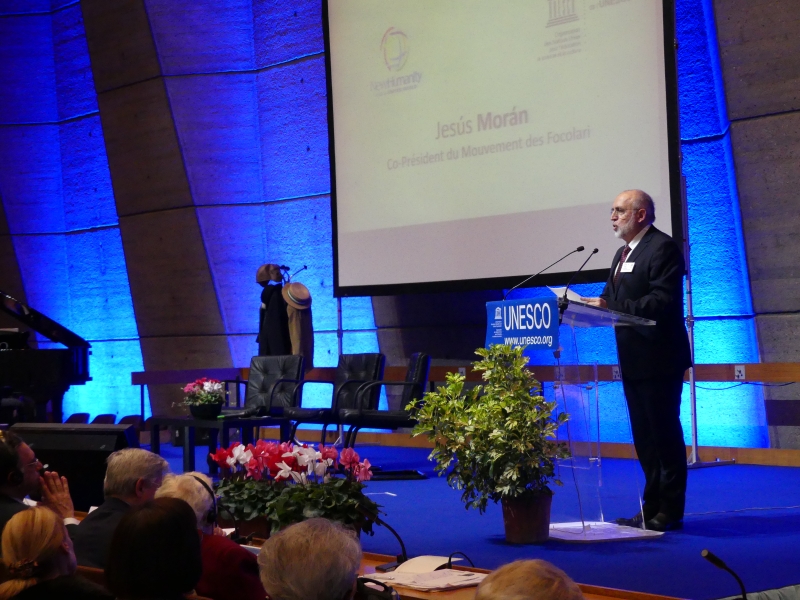
Jesús Morán © Fabio Bertagnin – CSC Audiovisivi
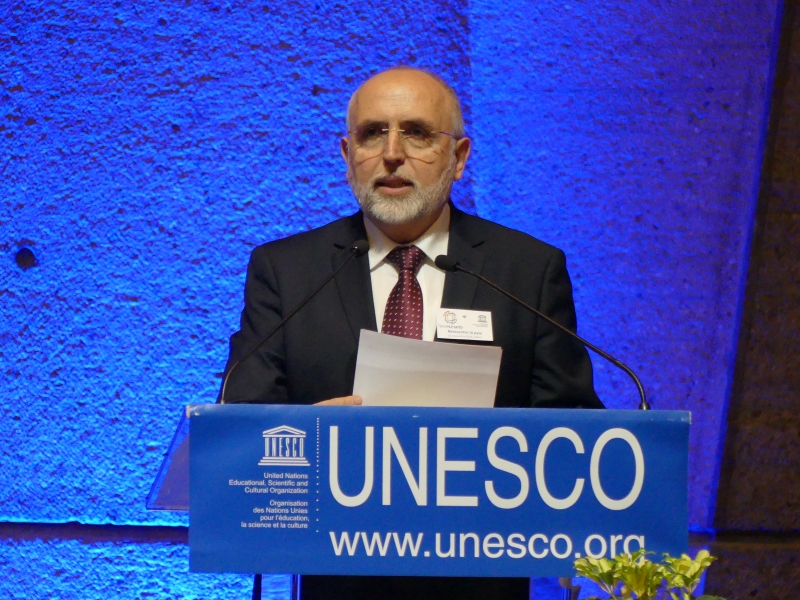
Jesús Morán © Fabio Bertagnin – CSC Audiovisivi
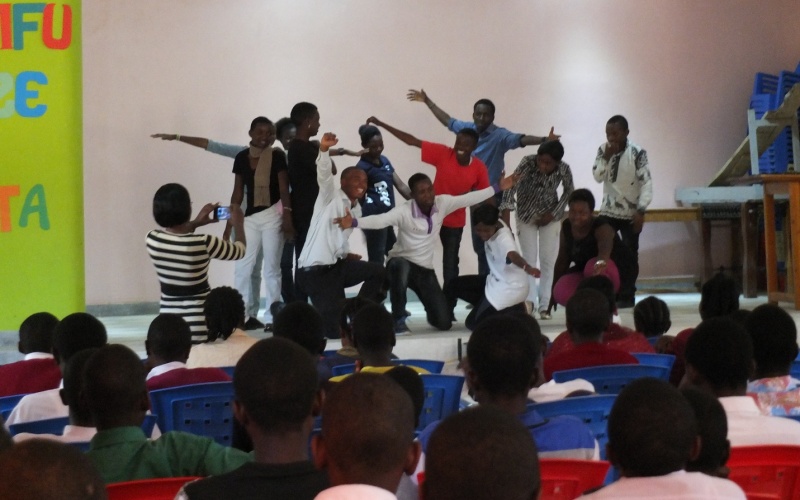
Nov 14, 2016 | Non categorizzato
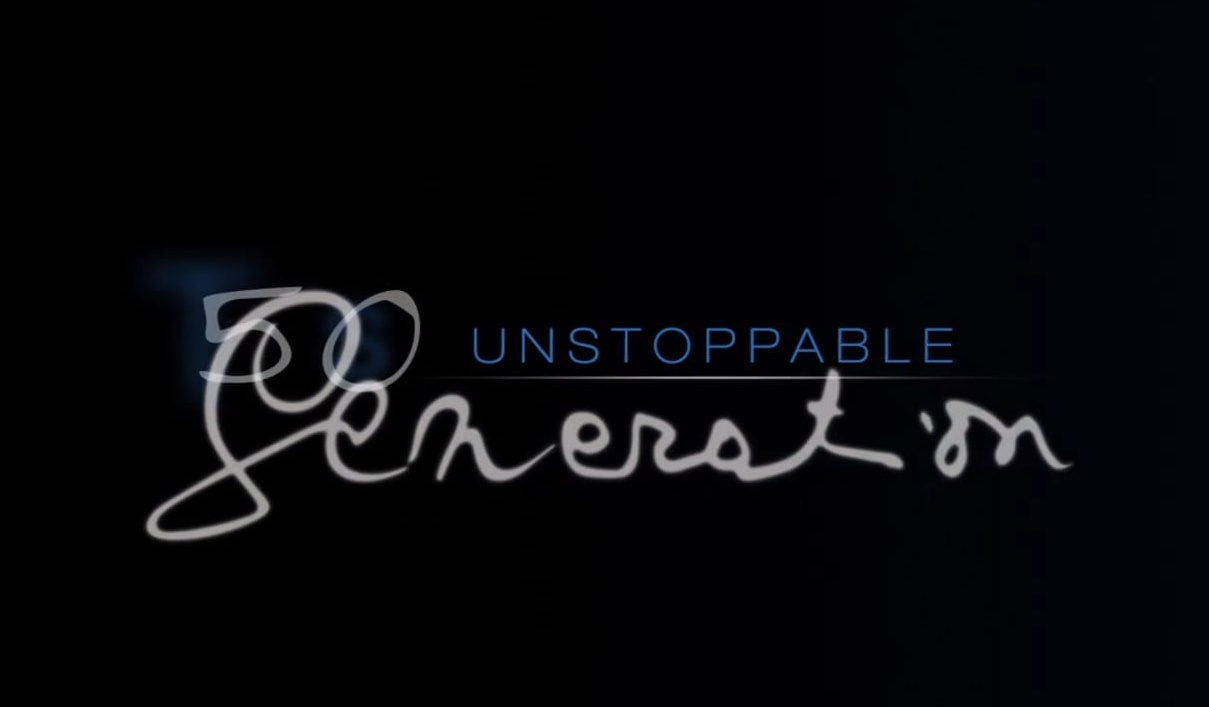 The Gen Movement has been around for fifty years, and still possesses the same freshness and the same ideal as when it first began. The Gen are the new generation of the Focolare. They will be gathering for their congress at Castel Gandolfo on November 17-20, 2016. A thousand young people will attend from all parts of the world. It’s not just any congress this time, but the big celebration of their 50th anniversary. In 1966, Chiara Lubich had appealed to the Focolare’s young people, that they engage the greatest number of their peers in living Jesus’s prayer “that all may be one.” Today, the Gen are everywhere: they belong to different religious faiths, speak many languages and dialects, and show the same enthusiasm and evangelical zeal that they had at the beginning.
The Gen Movement has been around for fifty years, and still possesses the same freshness and the same ideal as when it first began. The Gen are the new generation of the Focolare. They will be gathering for their congress at Castel Gandolfo on November 17-20, 2016. A thousand young people will attend from all parts of the world. It’s not just any congress this time, but the big celebration of their 50th anniversary. In 1966, Chiara Lubich had appealed to the Focolare’s young people, that they engage the greatest number of their peers in living Jesus’s prayer “that all may be one.” Today, the Gen are everywhere: they belong to different religious faiths, speak many languages and dialects, and show the same enthusiasm and evangelical zeal that they had at the beginning.  The first person to be raised to the glory of the altars by living Chiara Lubich’ spirituality of unity, was a Gen – young Chiara Luce Badano. She died in 1990 at the age of 18 and was beatified in 2010. She has become an example of belief in God’s love, both for young people and adults, even amidst illness and suffering. Each year, her feast day is celebrated around the world on October 29th.
The first person to be raised to the glory of the altars by living Chiara Lubich’ spirituality of unity, was a Gen – young Chiara Luce Badano. She died in 1990 at the age of 18 and was beatified in 2010. She has become an example of belief in God’s love, both for young people and adults, even amidst illness and suffering. Each year, her feast day is celebrated around the world on October 29th.  A few weeks ago the Gen held a celebration in Iringa, Tanzania where they presented her as a model of Christian life. They showed a video on Chiara Luce to a hundred young people, which was followed by testimonies and traditional dances. “I learned so much: for example, that I should love whoever is beside me. Here I discovered that it’s possible to be together in love, despite our differences.” “What touches me is Chiara Luce’s patience. She accepted her illness in its entirety, living every moment without complaint.” Despite all obstacles, the Gen forged ahead, for 50 years. They are truly the “Unstoppable generation”! Chiara Favotti
A few weeks ago the Gen held a celebration in Iringa, Tanzania where they presented her as a model of Christian life. They showed a video on Chiara Luce to a hundred young people, which was followed by testimonies and traditional dances. “I learned so much: for example, that I should love whoever is beside me. Here I discovered that it’s possible to be together in love, despite our differences.” “What touches me is Chiara Luce’s patience. She accepted her illness in its entirety, living every moment without complaint.” Despite all obstacles, the Gen forged ahead, for 50 years. They are truly the “Unstoppable generation”! Chiara Favotti
Fragments of history of the Gen Movement https://vimeo.com/191033570 https://vimeo.com/191033565 https://vimeo.com/191033568 https://vimeo.com/191033569 https://vimeo.com/191039964 https://vimeo.com/191033564
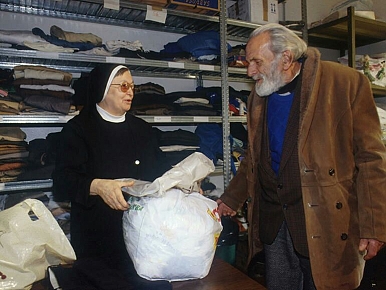
Nov 13, 2016 | Non categorizzato
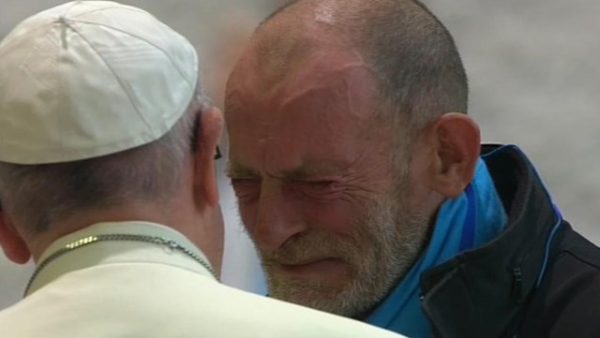 “A Church of the poor means two things mainly: the Church should be poor as Christ was poor, if it wants to proclaim the kingdom of God, if it wants its message to be effective. And all Christians who share in the life of the Church should be poor in spirit. Then the message of salvation would be more easily accepted by the poor; whereas, for the rich it will be difficult to enter the kingdom of Heaven than for a camel to go through the eye of a needle…. This Church of and for the poor should not make us imagine any similar socio-political version of it for the world. (…) When Jesus speaks of the poor, he means those who are being tested, who are humble, who are deprived of reassurance and beyond any real support that they can depend on – yet, they turn to God their just benefactor. The Greek translators of the Bible understood that the poverty of these poor was not merely material deprivation; in fact, they did not translate the Hebrew word anaw (poor), as ‘pauper’ or ‘destitute’ but preferred to use the word praus, which evokes meekness and resignation in the midst of hardship and trial.
“A Church of the poor means two things mainly: the Church should be poor as Christ was poor, if it wants to proclaim the kingdom of God, if it wants its message to be effective. And all Christians who share in the life of the Church should be poor in spirit. Then the message of salvation would be more easily accepted by the poor; whereas, for the rich it will be difficult to enter the kingdom of Heaven than for a camel to go through the eye of a needle…. This Church of and for the poor should not make us imagine any similar socio-political version of it for the world. (…) When Jesus speaks of the poor, he means those who are being tested, who are humble, who are deprived of reassurance and beyond any real support that they can depend on – yet, they turn to God their just benefactor. The Greek translators of the Bible understood that the poverty of these poor was not merely material deprivation; in fact, they did not translate the Hebrew word anaw (poor), as ‘pauper’ or ‘destitute’ but preferred to use the word praus, which evokes meekness and resignation in the midst of hardship and trial.  These poor, according to the Gospel, are also found among the privileged classes. Matthew’s Gospel tells us about Joseph of Arimathea, ‘a wealthy man and disciple of Jesus’ (27:57). He was also detached from his possessions; he was also poor and humble. (…) In his Apologeticum, Tertullian described the Christians of his day as those who did not aspire to or fight for positions in politics, even minor ones, because they were not motivated by personal ambition. On the other hand we find that many, who are economically disadvantaged, turn to messages they receive from outside the Church and support them. (…) This is why the Second Vatican Council invites us to think over our Christian living. Is it genuine? Does it bear the marks of poverty and humility? Poverty should result from love. Love is what will lead us to place our possessions at the disposal of the poor and needy. It is Christian love that banishes egoism and gives birth to communion. (…) Then the Church of the poor becomes the Church of communion between the rich that become poor and the poor that bring their needs, for the building of the Church together. (…) If we want that Church of the poor to return to taking on a role of witnessing in the process of evangelization, it will have to resurface at all levels of Christian life beginning from every point of the Church, from above and from below, from periphery to centre. (…) This will also have a reflection on the social and political level in new reforms that will be fundamentally Christian, if they are inspired by freedom. Some more sensitive spirits are not satisfied and still cry out that the Church must make itself poorer. (…) When someone makes a justified request, even when it is presented in a disorderly or bad manner, it is wise to wonder whether what is being asked might not be a spur to accelerate this process of renewal without which the Good News cannot be brought to all the peoples of the earth in a way that is genuinely helpful. Desiring peace, poverty, communion of goods as the outward signs of a communion of spirits – these are not allegations meant to frighten us: they are what spur us on along the path of the Gospel.” From: Pasquale Foresi, Problematica d’oggi nella Chiesa (Rome: Città Nuova Editrice, 1979).
These poor, according to the Gospel, are also found among the privileged classes. Matthew’s Gospel tells us about Joseph of Arimathea, ‘a wealthy man and disciple of Jesus’ (27:57). He was also detached from his possessions; he was also poor and humble. (…) In his Apologeticum, Tertullian described the Christians of his day as those who did not aspire to or fight for positions in politics, even minor ones, because they were not motivated by personal ambition. On the other hand we find that many, who are economically disadvantaged, turn to messages they receive from outside the Church and support them. (…) This is why the Second Vatican Council invites us to think over our Christian living. Is it genuine? Does it bear the marks of poverty and humility? Poverty should result from love. Love is what will lead us to place our possessions at the disposal of the poor and needy. It is Christian love that banishes egoism and gives birth to communion. (…) Then the Church of the poor becomes the Church of communion between the rich that become poor and the poor that bring their needs, for the building of the Church together. (…) If we want that Church of the poor to return to taking on a role of witnessing in the process of evangelization, it will have to resurface at all levels of Christian life beginning from every point of the Church, from above and from below, from periphery to centre. (…) This will also have a reflection on the social and political level in new reforms that will be fundamentally Christian, if they are inspired by freedom. Some more sensitive spirits are not satisfied and still cry out that the Church must make itself poorer. (…) When someone makes a justified request, even when it is presented in a disorderly or bad manner, it is wise to wonder whether what is being asked might not be a spur to accelerate this process of renewal without which the Good News cannot be brought to all the peoples of the earth in a way that is genuinely helpful. Desiring peace, poverty, communion of goods as the outward signs of a communion of spirits – these are not allegations meant to frighten us: they are what spur us on along the path of the Gospel.” From: Pasquale Foresi, Problematica d’oggi nella Chiesa (Rome: Città Nuova Editrice, 1979).
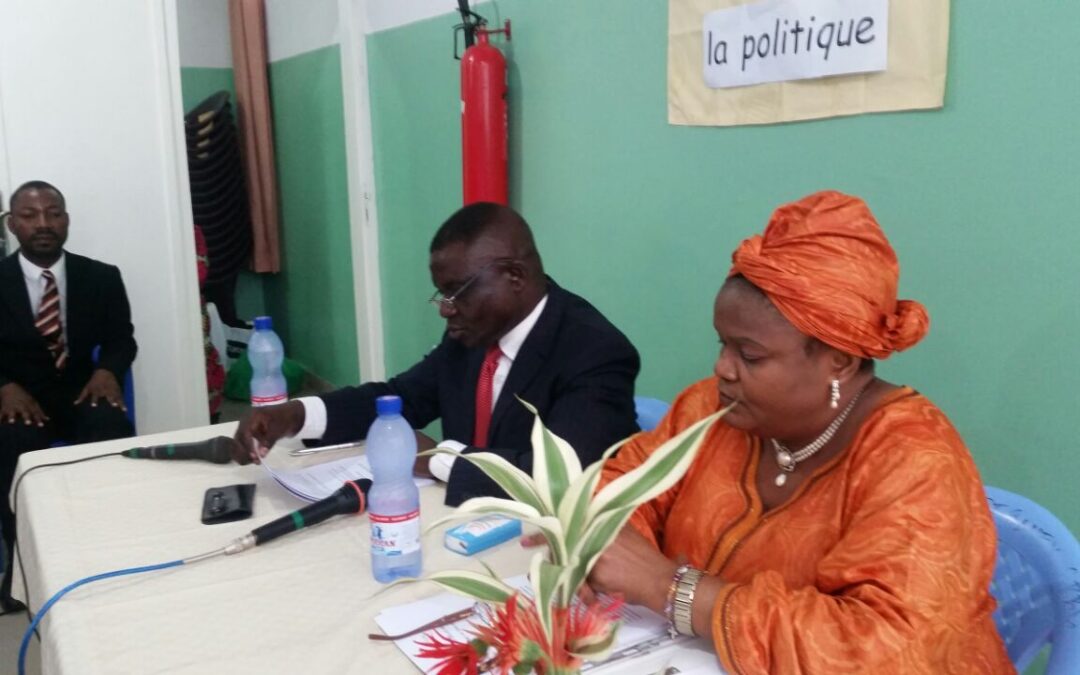
Nov 11, 2016 | Non categorizzato
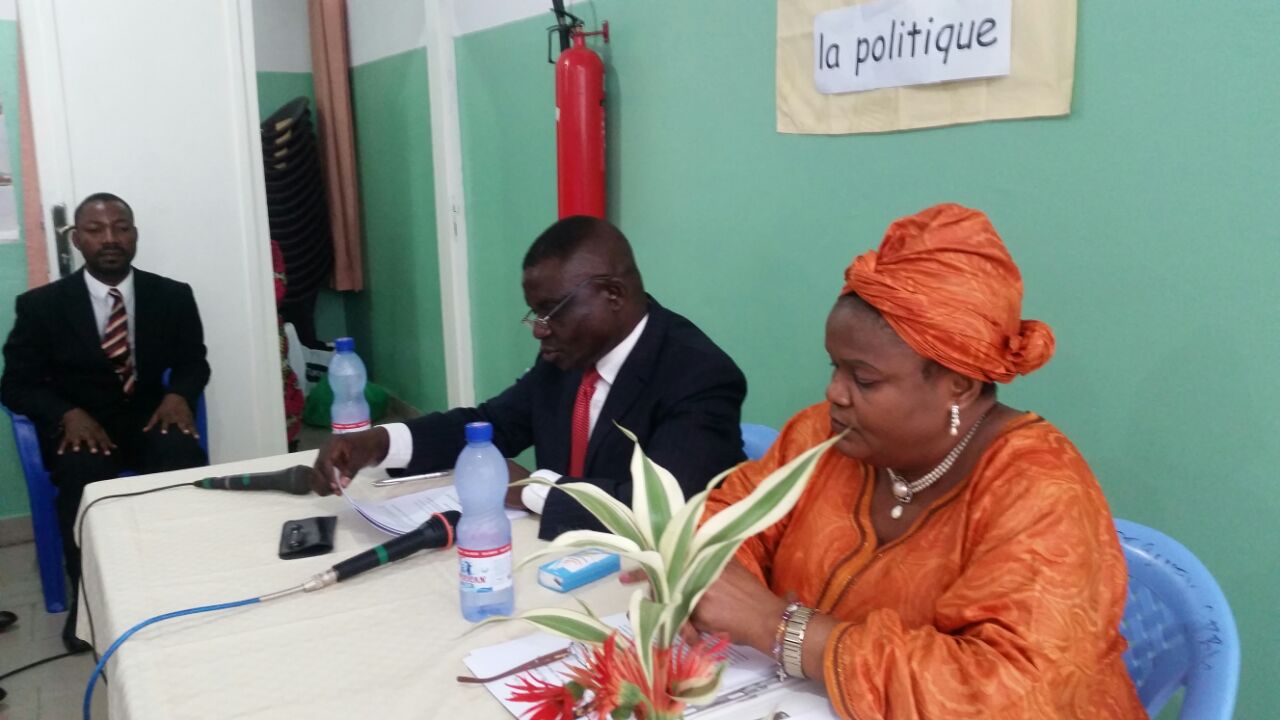 “The Political Movement for Unity has begun in Kinshasa!” With these words Deputy Upira Dieudonné concluded the first meeting of the Political Movement for Unity (PMU) in Kinshasa on Saturday, October 29, 2016. They write: “The current political situation in the RDC is fragile. There are strong political and social tensions. A few months ago, there were violent clashes in which some people died. The powers that be and the opposition sometimes become radicalized.” So how did we reach this day, one could ask. “It was after attending the conference in Rome last June with politicians from around the world. Deputy Dieudonné Upira, national deputy from the opposition in the DRC, and Madam Gorgine Madiko, Honorary Deputy and Member of the National Assembly Office decided to try something in their country.” When they returned from Rome, they deepened their friendship and shared their differing opinions with one another. Now, they dream of forming young people to be leaders in politics. As they said: it’s a matter of “training in the real politics, the politics that is based on values.” Their conversations have convinced them that the first step in such an undertaking in Kingshasa, would be to launch the Political Movement for Unity. “This would allow networking people who are working in the field of politics, to do good through politics,” they suggested. As they organized the event they were also wondering: “Will the people that have been invited have the courage to show up?” Their uncertainty grew as torrential rain began to pour down on Kinshasa on the day of the meeting. Because of the bad road conditions and the poor state of the public transport, most people stay home when it rains! Nevertheless, thirty people responded to their invitation. Among them were deputies and politicians, students, members of citizen movements, lawyers and journalists. The debate provided a platform for deep listening and discussion. “We heard things like: ‘We want to stay in touch with you and have more frequent discussions;’ ‘In front of the loss of values, we need to work at installing positive values in our education system, to train people that can be political leaders tomorrow;’ ‘I feel that if I don’t do something, God will ask me what I did with all that he gave to me;’ ‘We’re young and we expect to learn from our elders. Don’t forget about us’.” Their words reflected the thoughts of the organizers and made the moment of sharing into a sacred moment. During her concluding remarks, Madam Georgina Madiko insisted: “Through our actions we have to be a light in the dark world. We have to show by example. And to those who are surprised by us and ask whether we are doing politics or religion, we’ll answer that politics without values is the ruin of the Nation.” Before leaving one participant suggested: “We should forget about our titles, stay in touch with each other, even if it’s only to ask how we’re doing. I would like each one of us to go home with a list of the participants so that we can all stay in touch with one another.” The next appointment is December 3, 2016. Gustavo Clariá
“The Political Movement for Unity has begun in Kinshasa!” With these words Deputy Upira Dieudonné concluded the first meeting of the Political Movement for Unity (PMU) in Kinshasa on Saturday, October 29, 2016. They write: “The current political situation in the RDC is fragile. There are strong political and social tensions. A few months ago, there were violent clashes in which some people died. The powers that be and the opposition sometimes become radicalized.” So how did we reach this day, one could ask. “It was after attending the conference in Rome last June with politicians from around the world. Deputy Dieudonné Upira, national deputy from the opposition in the DRC, and Madam Gorgine Madiko, Honorary Deputy and Member of the National Assembly Office decided to try something in their country.” When they returned from Rome, they deepened their friendship and shared their differing opinions with one another. Now, they dream of forming young people to be leaders in politics. As they said: it’s a matter of “training in the real politics, the politics that is based on values.” Their conversations have convinced them that the first step in such an undertaking in Kingshasa, would be to launch the Political Movement for Unity. “This would allow networking people who are working in the field of politics, to do good through politics,” they suggested. As they organized the event they were also wondering: “Will the people that have been invited have the courage to show up?” Their uncertainty grew as torrential rain began to pour down on Kinshasa on the day of the meeting. Because of the bad road conditions and the poor state of the public transport, most people stay home when it rains! Nevertheless, thirty people responded to their invitation. Among them were deputies and politicians, students, members of citizen movements, lawyers and journalists. The debate provided a platform for deep listening and discussion. “We heard things like: ‘We want to stay in touch with you and have more frequent discussions;’ ‘In front of the loss of values, we need to work at installing positive values in our education system, to train people that can be political leaders tomorrow;’ ‘I feel that if I don’t do something, God will ask me what I did with all that he gave to me;’ ‘We’re young and we expect to learn from our elders. Don’t forget about us’.” Their words reflected the thoughts of the organizers and made the moment of sharing into a sacred moment. During her concluding remarks, Madam Georgina Madiko insisted: “Through our actions we have to be a light in the dark world. We have to show by example. And to those who are surprised by us and ask whether we are doing politics or religion, we’ll answer that politics without values is the ruin of the Nation.” Before leaving one participant suggested: “We should forget about our titles, stay in touch with each other, even if it’s only to ask how we’re doing. I would like each one of us to go home with a list of the participants so that we can all stay in touch with one another.” The next appointment is December 3, 2016. Gustavo Clariá

 I thought I knew everything “As a priest, I thought I knew how to judge everything. One day I was invited to celebrate Mass at a retreat of some committed young people. During the rites they explicitly made a pact to be ready to give their lives for each other. I was shocked! Would I have been able to do such a thing? All that I knew it seemed, although not useless, was insufficient to be a true Christian. How many things were neglected in the name of studies? How many omissions were justified with some effort I thought was important! Those young people have changed my life.” (RP – France) Before the offering “After moving into the new village, the friendship that was born with a family in the neighbourhood greatly helped us to insert ourselves into the new environment, even helping the children get to school. There was mutual esteem.The children of that family called us uncle and auntie and so did our children also address them that way. Unfortunately, in time the relationship became a bit strained and the children of these neighbours began to greet us with a formal “Good morning”. It could not go on like this also because we belonged to the same parish. One Sunday at Mass, the Gospel passage reminded us that before making an offering at the altar, it would be well to reconcile oneself with the brother. My wife and I looked at each other and we decided to act accordingly. After Mass, we approached those neighbours and asked their forgiveness if we had offended them in some way. After a moment of awkwardness, we hugged each other.” (AT – Hungary) She was another person “In the hospital where I work as a gynecologist, a woman known as a prostitute was admitted. Other patients and even some nurses tried to avoid her. Noticing her isolation, I gave her particular attention and this encouraged others to also talk to her and give her some help. The same sad story of her life attracted attention and benevolence. In just a few days, she already seemed another person. When she was discharged from the hospital, she thanked me saying, “True healing is not physical. Life starts again in another way.” (MS – Poland)
I thought I knew everything “As a priest, I thought I knew how to judge everything. One day I was invited to celebrate Mass at a retreat of some committed young people. During the rites they explicitly made a pact to be ready to give their lives for each other. I was shocked! Would I have been able to do such a thing? All that I knew it seemed, although not useless, was insufficient to be a true Christian. How many things were neglected in the name of studies? How many omissions were justified with some effort I thought was important! Those young people have changed my life.” (RP – France) Before the offering “After moving into the new village, the friendship that was born with a family in the neighbourhood greatly helped us to insert ourselves into the new environment, even helping the children get to school. There was mutual esteem.The children of that family called us uncle and auntie and so did our children also address them that way. Unfortunately, in time the relationship became a bit strained and the children of these neighbours began to greet us with a formal “Good morning”. It could not go on like this also because we belonged to the same parish. One Sunday at Mass, the Gospel passage reminded us that before making an offering at the altar, it would be well to reconcile oneself with the brother. My wife and I looked at each other and we decided to act accordingly. After Mass, we approached those neighbours and asked their forgiveness if we had offended them in some way. After a moment of awkwardness, we hugged each other.” (AT – Hungary) She was another person “In the hospital where I work as a gynecologist, a woman known as a prostitute was admitted. Other patients and even some nurses tried to avoid her. Noticing her isolation, I gave her particular attention and this encouraged others to also talk to her and give her some help. The same sad story of her life attracted attention and benevolence. In just a few days, she already seemed another person. When she was discharged from the hospital, she thanked me saying, “True healing is not physical. Life starts again in another way.” (MS – Poland)






 “A Church of the poor means two things mainly: the Church should be poor as Christ was poor, if it wants to proclaim the kingdom of God, if it wants its message to be effective. And all Christians who share in the life of the Church should be poor in spirit. Then the message of salvation would be more easily accepted by the poor; whereas, for the rich it will be difficult to enter the kingdom of Heaven than for a camel to go through the eye of a needle…. This Church of and for the poor should not make us imagine any similar socio-political version of it for the world. (…) When Jesus speaks of the poor, he means those who are being tested, who are humble, who are deprived of reassurance and beyond any real support that they can depend on – yet, they turn to God their just benefactor. The Greek translators of the Bible understood that the poverty of these poor was not merely material deprivation; in fact, they did not translate the Hebrew word anaw (poor), as ‘pauper’ or ‘destitute’ but preferred to use the word praus, which evokes meekness and resignation in the midst of hardship and trial.
“A Church of the poor means two things mainly: the Church should be poor as Christ was poor, if it wants to proclaim the kingdom of God, if it wants its message to be effective. And all Christians who share in the life of the Church should be poor in spirit. Then the message of salvation would be more easily accepted by the poor; whereas, for the rich it will be difficult to enter the kingdom of Heaven than for a camel to go through the eye of a needle…. This Church of and for the poor should not make us imagine any similar socio-political version of it for the world. (…) When Jesus speaks of the poor, he means those who are being tested, who are humble, who are deprived of reassurance and beyond any real support that they can depend on – yet, they turn to God their just benefactor. The Greek translators of the Bible understood that the poverty of these poor was not merely material deprivation; in fact, they did not translate the Hebrew word anaw (poor), as ‘pauper’ or ‘destitute’ but preferred to use the word praus, which evokes meekness and resignation in the midst of hardship and trial. 
